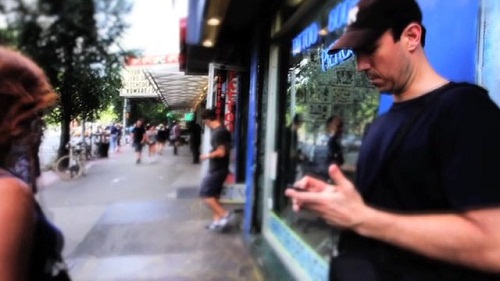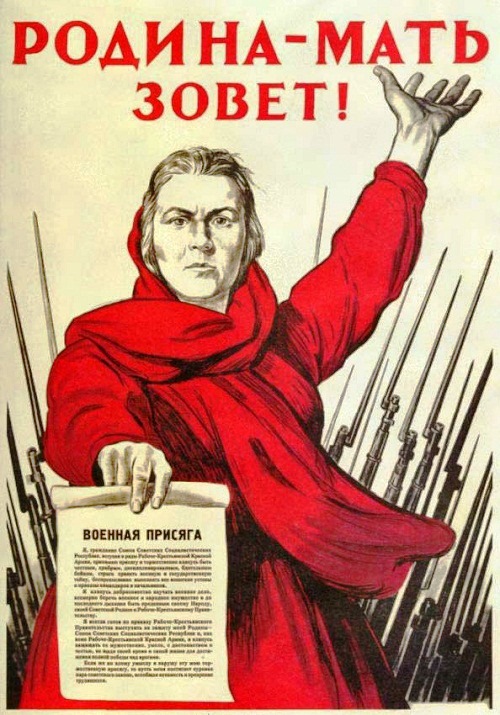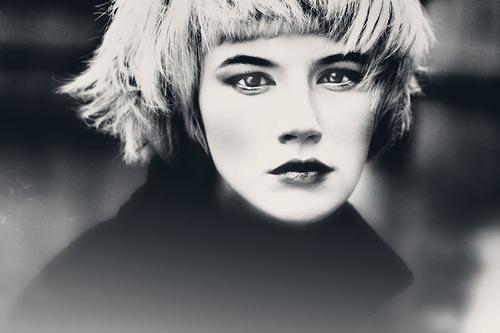Nina Vatolina Do not talk poster
Nina Vatolina Do not talk poster
Soviet artist and beautiful woman Nina Vatolina (1915-2002) is the author of the famous poster “Do not talk!” (1941). It was a tragic time, and the poster was created to help in the fight to survive with a deadly enemy. This is a very sincere work. Moscow in the evening immersed in darkness – blackout on the windows, every day fighting was getting closer and closer to the capital. One day the editor of “Izogiz” Elena Povolotskaya said: “We have to do a poster – and she put a finger to her lips. – It is necessary to less talking now”. Nina asked her neighbor to pose for it, her neighbor had two sons, who were at war at that time. But the eyes and emotional expression – the artist’s reflection in the mirror, as she explained it herself. Later in one of the artist’s interviews she said “What are these paintings for? Were they needed by someone? All of these spells – “Forward”, “Avenge”, “Bay”, “For the Motherland!” ever got into someone’s heart? I doubt it.” (Do not talk! Nina Vatolina)

Self-portrait of 1934, Nina Vatolina. Beautiful woman, talented painter, famous poster artist and fine writer, Nina lived a wonderful creative life
Born March 6, 1915 in Kolomna, she grew up in a family of a military engineer. In 1932-1936 she studied at the Art College, then she entered Moscow State Institute, painting department (1937-1942). As a student, she was keen on painting, portrait, pure art. But the war made Nina Vatolina to devote herself to the political posters.
In 1941 she creates, perhaps the most famous poster in the history of Soviet art: “Do not talk!”. Sounded with great force, still popular poster, even iconic, which decorates the interiors of some offices.
However, in the sixties, she gave up painting posters, at the height of her fame. Nina Vatolina changed political graphics on the canvas, and started her career in literature. The beautiful woman, artist Nina Vatolina was talented in everything she did. Her books were published in the publishing house “Soviet Artist”: “We poster artists” 1962, “Walk in the Tretyakov Gallery” 1976, “Landscapes of Moscow” 1983, “Sketches from memory.” The last part of the book “Sketches from memory” was completed in 2000 and is devoted to her husband Max Birstein.
Nina Vatolina died August 12, 2002 in her own house in Tarusa. The artworks of Nina Vatolina are stored at the Art Museum of Volgograd, Saratov Art Gallery, Art Gallery of Tula, Serpukhov Art Museum, private collections in Russia and abroad.
Vatolina and Birstein were remarkably good-looking couple, which was impossible not to admire. Nina’s young age ballet lessons preserved the harmony and poise, beautiful eyes and hair, as well as her usual expression – a serious and inquisitive, which she so accurately reproduced in her famous self-portrait of 1934.
Soviet artist, he always looked elegant, as noble movie hero, Soviet Paul Newma. In an evening jacket with a bow tie, and in a fancy hat, and in a canvas hunting coat. Max and Nina traveled extensively across the country and abroad. As individuals Birstein and Vatolina seemed completely different. He – sparkling with wit and fun, with aristocratic features, and she – serious, thoughtful, but both were artists, beautiful personalities, who lived a long and happy life together.
The poster encourages young people to check their health before marriage, and if pregnancy occurs seek antenatal care and follow all the instructions of the doctor.
Nina Vatolina’s granddaughter Maria Tsigal (January 3, 1980, Moscow, USSR) – Russian fashion designer, stylist. Born into a family of artists Alexander Tsigal and Anna Birnshteyn. She studied at the Moscow Art and Industry Institute of the Stroganov.
In 2000 she received a degree of London College in fashion marketing. The first show was held in 1999 as part of London Fashion Week. In 2003, Maria launched her own brand Masha Tsigal. In 2004, Mary was recognized the best fashion designer of Russia, by magazine “Person of the Year. Idols of Russia. ”
Nina Vatolina Do not talk poster
nasledie-rus.ru/podshivka/8617.php


























